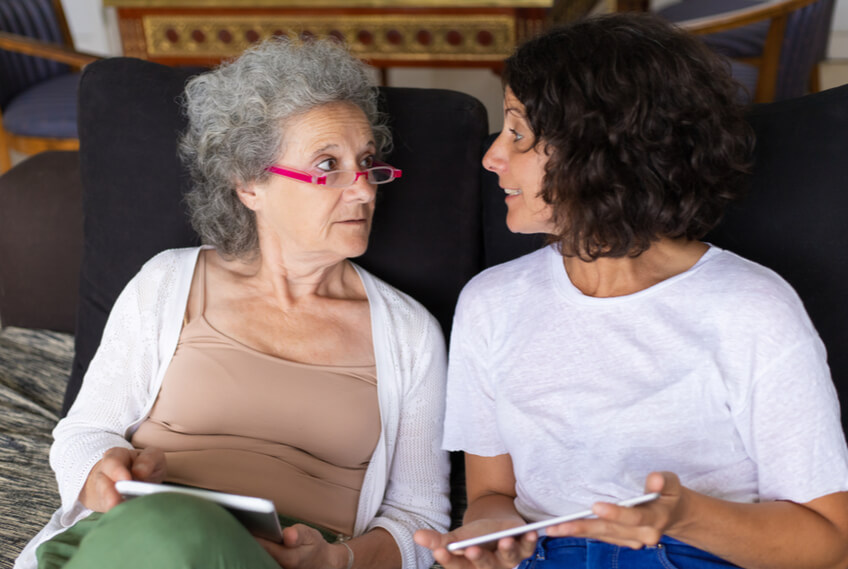How to Talk to Your Aging Parents About Medical Alert Systems
nina

As your parents get older and require additional attention to health, it’s important to establish a safety and care plan. This isn’t necessarily an easy pitch to your parents, who may be quick to reject the idea that they need elderly care. They may be uncomfortable with or offended by the idea of their adult child caring for them.
Reassure them that you aren’t suggesting anything that would take away their independence, such as a nursing home. On the contrary, investing in medical alert devices makes aging in place possible. You don’t want to change their lifestyle—you want to help them maintain the one they already have!
If you’re nervous about having this discussion with your parents, don’t just put it off. It’ll be easy if you take the time to prepare and anticipate any concerns they may have about medical alert systems. Here are a few tips to help you guide your chat.
Plan a Time to Talk
No matter how much time you spend preparing for this conversation, it won’t go well if you haven’t agreed on a time to talk to your parents. Establishing a care plan for your aging parents is inevitably stressful and even more so when it comes to them as a surprise.

When you bring up the subject of elderly care without warning, it can feel like a personal attack or intervention. In this instance, they are more likely to react with resistance and less likely to hear the important points you are making.
Arranging a private, stress-free time to discuss getting a medical alert system gives your parents time to mentally prepare. Leading up to the talk, they can jot down any concerns they may have so they can be an equal part of the conversation.
You may also suggest that your parents reach out to their doctor in the meantime. Having the support of a professional will help them grow more comfortable with the idea.
Make It About Independence
Older adults often resist the idea of elderly care because they fear that it equates to a loss of freedom. But with medical alert devices, this is surely not the case. Unlike in a nursing home, there is no one they need to report to and no additional rules they must follow.
Instead, they get the security of knowing that an emergency support agent is available around the clock and, if need be, they can contact them with the click of a button. That’s nursing home-level support in the freedom of your own home, only when you want or need it.
When talking to your aging parents, emphasize that without a medical alert device, they won’t be able to maintain the level of independence they’re used to.

Ask Them to Do It For You
Telling your parents that they need a medical alert device in their home might be coming on too strong. If they feel like you are making the decision, not them, they may be less on board. By switching the rhetoric and framing it as a personal request, they may be more likely to agree.
So, express that you want them to get an in-home medical alert system for your peace of mind.
Because you love them, you want to make sure that they are safe. For parents that are having a hard time accepting their children as their caretakers, this wording reassures them that they are still capable of caring for you.
Underscore the Risk of Falls
One reason falling is such a danger to your aging parents is that bones get weaker and more brittle as you age, increasing the risk of fracture. But the discomfort of a fractured hip and costly hospital fees aren’t all that’s at stake. When an older adult falls and is unable to get up to call for help, they may spend hours stranded helplessly on the floor, which can lead to serious mental distress and trauma.
Wearing a medical alert device ensures that they are able to call for help whenever and as soon as possible. Most medical alert systems offer automatic fall detection so that your parents don’t have to worry about pressing the help button. As soon as they fall, emergency help is dispatched.

If your parent hasn’t fallen yet, they might not grasp how grave the risk is. Use statistics to emphasize the importance of protecting against falls. Tell them that the CDC reports that falls send 800,000 Americans to the hospital per year and that the AARP has noticed a 31% increase in death rate linked to falls between 2007 and 2016.
You don’t want to scare them, but you do need to get the point across.
Explain Why A Cell Phone Won’t Cut It
Maybe your aging parents don’t think that a medical alert system is necessary when you can just carry your cell phone instead. Or perhaps they don’t want to pay for both monthly services. While cell phones may seem like a practical solution in an emergency, they are actually far less reliable than a medical alert device.
Some of the several reasons you shouldn’t rely on your cell phone in an emergency include the fact that they are often overly complex, their battery lives are limited, and they may shatter and become useless in the event of a fall.
Make It Sound Simple
Making the decision to install a medical alert system in your home can feel like a big deal, but it really isn’t. Put your parents’ worries to rest by explaining how simple using these systems can be.
For most medical alert systems, installation is as easy as plugging in the console. Any wall buttons you may choose to install in your home come pre-programmed so all you have to do is affix them to the wall. The same is true for wearable devices: as soon as you receive them, they should be fully functional.
In-home systems, as well as mobile devices, use powerful 2-way speakers to facilitate communication between your loved one and a support agent. Agents are available all day, every day, to provide around the clock coverage for your aging parents. In case of an emergency, they simply have to press the button on their wall or wearable device and they will be connected with a support agent in seconds.
Discuss the Options Together
In the end, it’s important that your aging parents feel like they have control over the decision. They won’t want to invest in a medical alert system if they feel like they are being forced.
Once you’ve addressed all of their concerns and have expressed all the reasons you think a medical alert system is a good idea, take time to weigh the options. You can use our reviews as helpful resources for comparison.
Making this decision together ensures that while your parents continue aging in place, you can rest assured of their safety.
Liked this article?
nina

Thank you!